07
Highlights:
- 317 MNAs-elect administered oath in Inaugural Session of the 16th National Assembly
- Election of Premier, Speaker and Deputy Speaker during Inaugural Session
- National Assembly disposed of 91.07% agenda items in its 1st session over 22 hours and 50 minutes in 7 sittings
Working Hours
The inaugural session of the 16th the National Assembly elected on February 08, 2024 was convened on February 29, 2024 and was prorogued on March 15, 2024.
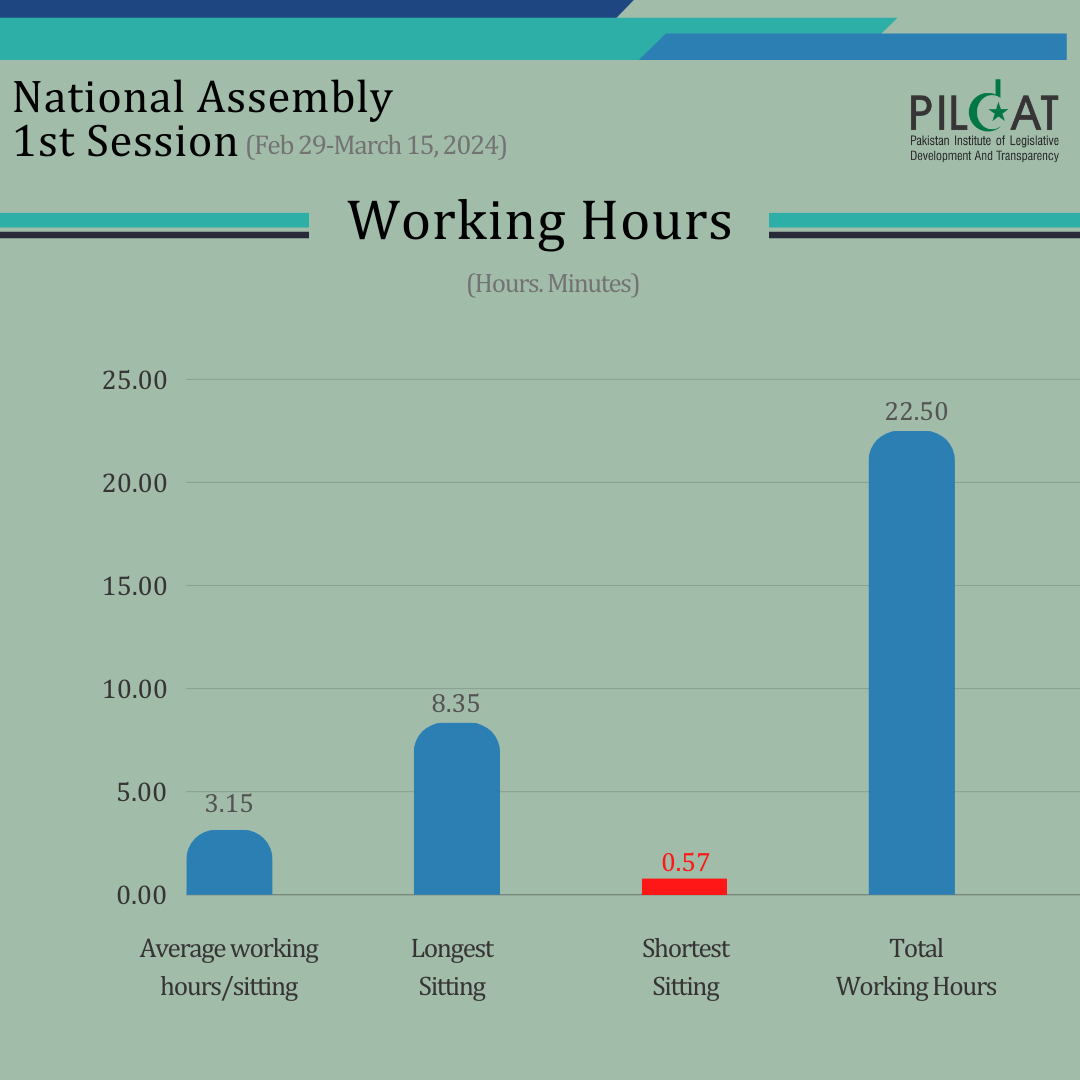
The 16th National Assembly could only be convened for its inaugural session on February 29 after the President received criticism for the delay in summoning the session. [1]
Convening of the inaugural session was delayed after President Alvi’s delayed response to the official summary requesting the summoning of session sent to him by the Parliamentary Affairs division requesting that the session be convened within 21 days as per Article 91(2) of the Constitution. On February 26, 2024, Speaker of the outgoing National Assembly, Raja Pervaiz Ashraf had to summon the inaugural sitting of the National Assembly for February 29, 2024 after President Arif Alvi refused to summon the session on account of an ‘incomplete house.’ [2] On February 27, Caretaker Prime Minister Mr. Anwaar-ul-Haq Kakar once again advised the President to convene the session while granting authority to the National Assembly secretariat to call the session after the constitutional deadline. [3] Finally, on February 29, President Dr. Arif Alvi also approved the summary calling for inaugural session of the 16th National Assembly. A statement issued by the Presidency, took issue with the tone of the summary sent to President Alvi by Caretaker PM adding that he was calling the session as he expected that the issue of reserved seats would be settled by the 21st day after the polls, as envisaged in the law.[4]
Outgoing Speaker of the 15th National Assembly Raja Pervaiz Ashraf MNA (NA- 52 Rawalpindi-I, Punjab, PPPP) administered oath to 302 MNAs-elect out of a total strength of 336. Following the first sitting of the session, the newly elected Speaker Sardar Ayaz Sadiq, MNA (NA-120 Lahore, Punjab, PML-N) administered the oath to an additional 15 MNAs-elect. This brought the total number of MNAs who took the oath in the inaugural session of the NA to 317.[5] Out of the 266 general seats of in the National Assembly, 96 or 36% are first time elected MNAs. Out of the 96, 52 were PTI-backed independents candidates. The Pakistan Muslim League-Nawaz (PML-N) had 15 first time elected MNAs while the Pakistan Peoples Party Parliamentarians (PPPP) and the Muttahida Quami Movement-Pakistan (MQM-P) have 11 each and six women candidates who for the first time won seats in a direct contest.[6]
The inaugural session also witnessed the election of the Speaker, Sardar Ayaz Sadiq, MNA (NA-120 Lahore, Punjab, PML-N), the Deputy Speaker, Syed Ghulam Mustafa Shah, MNA (NA- 208 Shaheed Benazirabad-II, Sindh, PPPP),[7] and the 24th Prime Minister of Pakistan, Mr. Muhammad Shehbaz Sharif, MNA (NA-123 Lahore-VII, Punjab, PML-N). [8]
Seven (7) sittings were held during the inaugural session spanning over 16 days. The schedule of the sittings during the session is given in Appendix A.
The inaugural session lasted 22 hours and 50 minutes with an average time of 3 hours and 15 minutes per sitting. The longest sitting of the session was held on Friday, March 1, 2024 when the House was adjourned after meeting for 8 hours and 35 minutes. The shortest sitting was held on Wednesday, March 13 when the House was adjourned after meeting for only 57 minutes.
The average delay in starting a sitting was 48 minutes during the session.
Agenda Items Left Over
The agenda of the inaugural session typically includes the oath to members and the election of the speaker, the deputy speaker and the Prime Minister. While these agenda items were fully covered by the National Assembly, only two (2) agenda items were left over during the first session.
On March 13 2024, an agenda item left over included “Felicitations to the Prime Minister of the Islamic Republic of Pakistan,” while on March 15, 2024, the agenda item deferred was a calling attention notice by Ms. Aliya Kamran, MNA (Women Reserved Seat, Balochistan, JUIP) to invite attention of the Minister for Overseas Pakistanis and Human Resource Development to a matter of urgent public importance regarding the “failure of the Bureau of Emigration and Overseas Employment to redress the grievances of citizens seeking employment abroad against overseas employment promoters.” Except these two sittings, every other sitting saw disposing of 100% agenda.
Details of the Agenda Items Left over are given in Appendix B.
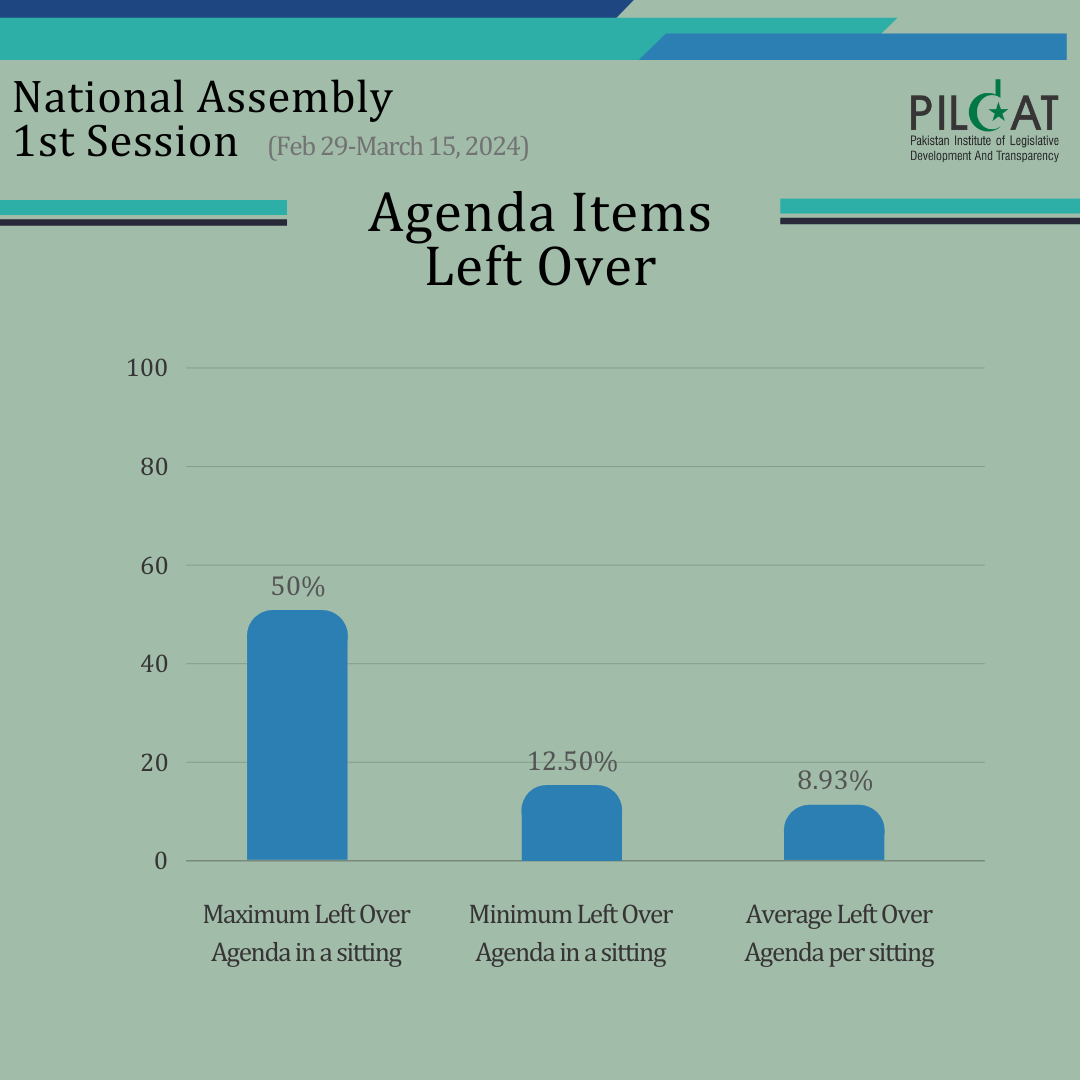
Quorum
Lack of quorum was pointed out only once (1) out of 7 sittings, on Friday March 15, 2024. The sitting, however, was not adjourned on that account.
Attendance
On average, 260 (77.48%) MNAs were recorded as present in the session.
Mr. Muhammad Shehbaz Sharif, MNA (NA-123 Lahore, Punjab, PML-N) was elected as Prime Minister of Pakistan on March 03, 2024. He attended 4 sittings or 57% out of 7 sittings during the 1st session of the National Assembly.
Top 5 Vocal MNAs
Mr. Omar Ayub Khan, MNA (NA-18 Haripur, KP, Independent), was the most vocal MNA during the inaugural session, with a recorded talk time of 2 hours and 47 minutes, followed by Mr. Muhammad Shehbaz Sharif, Prime Minister of Pakistan, MNA (NA-123 Lahore, Punjab, PML-N), who spoke for 1 hour and 24 minutes. Mr. Bilawal Bhutto Zardari, MNA (NA-197 Larkana-I, Sindh, PPPP), spoke for 54 minutes during the 1st session. Barrister Gohar Ali Khan, MNA (NA-10 Buner-I, KP, Independent), spoke for 35 minutes, and Mr. Asad Qaiser MNA (NA-19 Swabi, KP, SIC), spoke for 25 minutes.
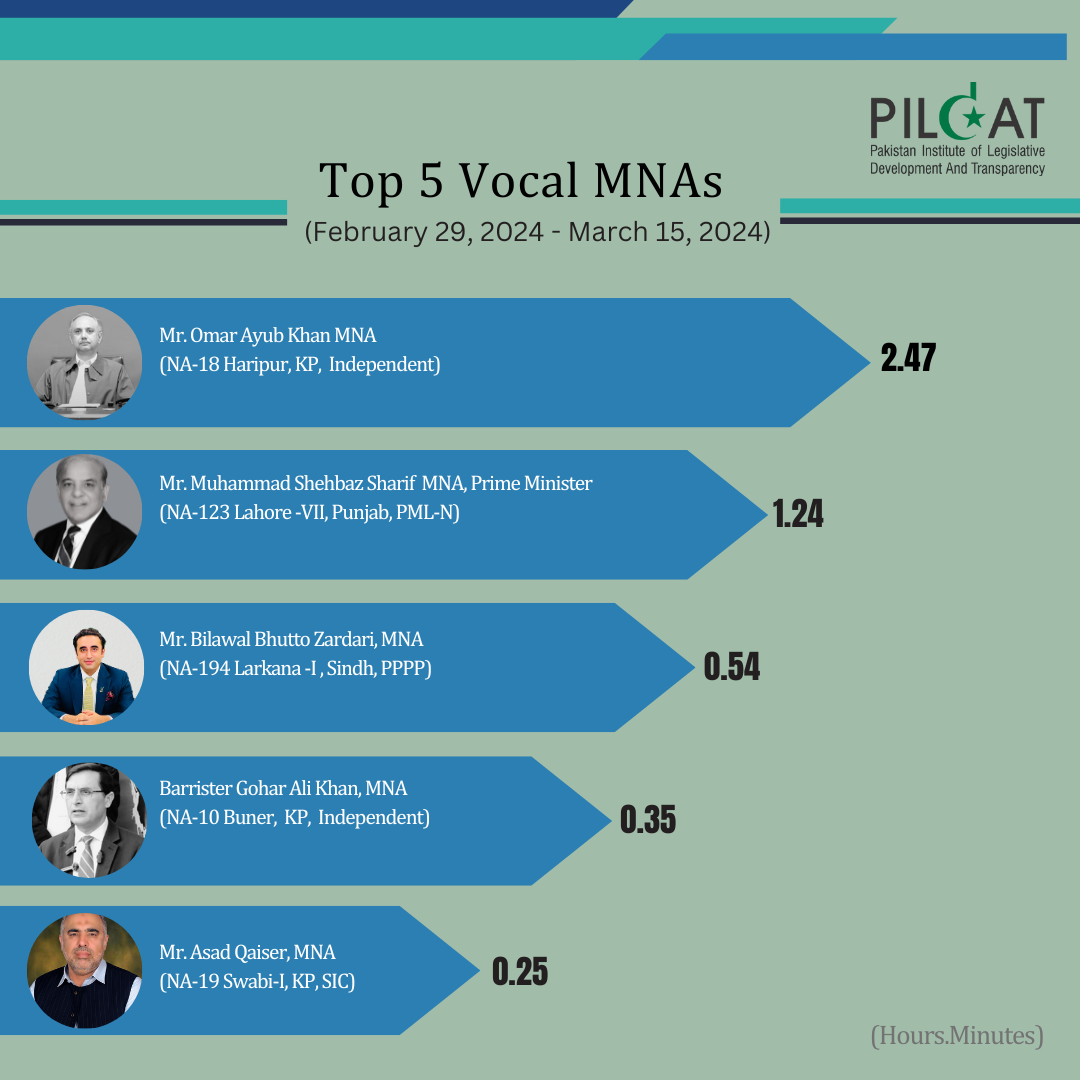
Legislation
Two (2) government bills were introduced in the newly-elected National Assembly but none were passed. These included the Civil Courts (Amendment) Bill, 2024 which aimed to reduce the burden of litigation on the appellate side of the Islamabad High Court by modifying the pecuniary appellate jurisdiction limits. Due to high property prices in Islamabad, most appeals against civil court orders exceed 2.5 million rupees, increasing the case backlog. While the Lahore High Court has raised its limit to 50 million rupees, Islamabad’s limit remains at 2.5 million. Therefore, the amendment proposed to transfer these appeals to District Courts to manage the caseload more effectively.
The Legal Aid and Justice Authority (Amendment) Bill, 2024 sought to transfer the administrative control of the Legal Aid and Justice Authority (LAJA) from the Ministry of Human Rights to the Ministry of Law and Justice. This change was deemed more suitable given the Ministry of Law and Justice’s existing oversight of legal frameworks and its established relationships with legal bodies and associations. The bill was referred to Standing Committee on March 15, 2024 for review.
No Private Members bill was introduced during the session.
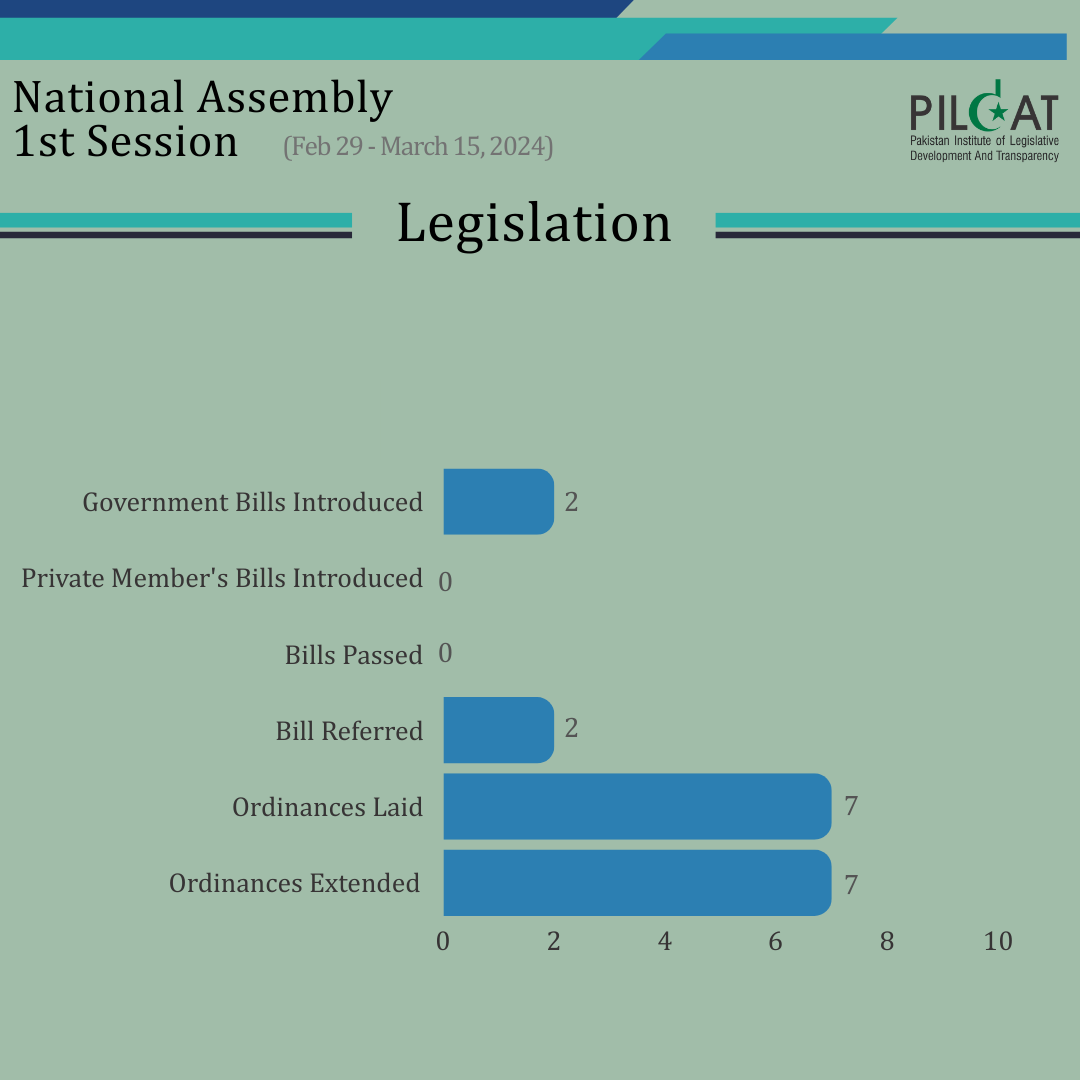
Seven (7) ordinance were laid and extended during the session. On March 15, 2024, the National Assembly passed a resolution for the extension of the ordinances. The ordinances were issued by the Federal Caretaker government apparently to satisfy the requirements of the International Monetary Fund (IMF).[9] These included the Pakistan Broadcasting Corporation (Amendment) Ordinance, 2023, the Pakistan National Shipping Corporation (Amendment) Ordinance, 2023, the Pakistan Postal Services Management Board (Amendment) Ordinance, 2023, the National Highway Authority (Amendment) Ordinance, 2023, the Criminal Law (Amendment) Ordinance, 2023, the Privatisation Commission (Amendment) Ordinance, 2023, and the Establishment of Telecommunication Appellate Tribunal Ordinance, 2023.
The PTI-backed members from the Sunni Ittehad Council (SIC) opposed the extension of ordinances. Mr. Omar Ayub Khan, MNA (NA-18 Haripur, KP, Independent) criticized the hurried legislative process and questioned its implications for the country’s sovereignty. Similarly, Mr. Asad Qaiser, MNA (NA-19 Swabi, KP, SIC) condemned the rushed introduction of bills and ordinances and stressed the importance of granting more time to the opposition for thorough review of these.
Syed Naveed Qamar MNA (NA-221 Tando Muhammad Khan, Sindh, PPPP) expressed reservations about both the presentation and content of the ordinances asserting that they would not allow any violations of parliamentary rules. Mr. Qamar emphasized that while his party was part of the ruling coalition and had voted in favor of the government, they still had concerns. He urged the chair to rule that the laws would not be implemented until they were approved by the house and its committees. He also advised the government to adjourn the house properly if it intended to run parliament in this manner. Syed Khursheed Shah, MNA (NA-201 Sukkur-II, Sindh, PPPP) stated that the government cannot rely solely on ordinances as this house is meant for legislation.[10]
Speaker Sardar Ayaz Sadiq, MNA (NA-120 Lahore, Punjab, PML-N) while responding to a point raised by the PPPP member Mr. Abdul Qadir Patel, MNA (NA-243 Karachi Keamari-II, Sindh, PPPP) said that three days prior notice to lay and extend ordinances was not given because of the IMF-related issues. He added that any delay would adversely affect Pakistan and that suspending this rule was in the national interest. As the Speaker introduced the motion for extension, the opposition called for a vote count, resulting in 130 members in favour and 63 against. The extended ordinances, each for an additional 120 days as per Clause (2) of Article 89 of the Constitution, include amendments to the management structures of various national entities to increase their autonomy and decision-making independence.[11]
The House also adopted a resolution moved by Ms. Shazia Marri, MNA (NA-209 Sanghar-1, Sindh, PPPP), denouncing the Israeli attacks on Palestinians. The resolution coincided with the International Day to Combat Islamophobia. It declared that the House “acknowledges this day as a moment to fight Islamophobia, reaffirming Islam’s values of peace, tolerance, and inclusivity.” The resolution, “categorically condemns Israel’s war on Palestine, where the latest attack cost 21 lives of Palestinians standing in the line for aid during the holy month of Ramazan denounces the continued Israeli aggression, which has led to the loss of over 30,000 lives since October 7, 2023.” It urged the Federal Government to take a more assertive stance in compelling the international community to implement a ceasefire in Gaza. Additionally, the House paid respects with a Fateha for Palestinians who lost their lives in Gaza.The Resolution was signed by all political parties in the House.[12]
The inaugural session of the 16th National Assembly was marred by protests from the PTI-backed Independent MNAs who claimed that the Assembly was incomplete without the assigning of reserved seats to the PTI/SIC. Protest slogans included “gulaami na-manzoor” [slavery unacceptable]. Omar Ayub Khan MNA (NA-18 Haripur, KP, Independent) said that “the oath we took today binds us to adhere to the rules and laws”. However, he pointed out that, several PTI-backed female lawmakers from the February 8 General Election are still imprisoned. Barrister Gohar Ali Khan MNA (NA-10 Buner-I, KP, Independent) said the PTI-backed lawmakers’ journey to the NA was challenging, hindered by restrictions on rallies and gatherings. Furthermore, he asserted that “You truly represent the public only when you honor their mandate,” referencing the PTI’s report to the Election Commission of Pakistan about having 180 members in the NA. “Our party symbol was taken away, our leader faced convictions in three cases, but the nation has reaffirmed that the most popular leader here is Imran Khan,” he continued. Gohar emphasized the Assembly’s incompleteness due to the unallocated reserved seats for the SIC, urging Speaker Ashraf to postpone the elections for the Speaker and Deputy Speaker until the PTI-backed members on reserved seats were sworn in[13]
On March 1, 2024, Sardar Ayaz Sadiq, MNA (NA-120 Lahore, Punjab, PML-N) was elected Speaker of the 16th National Assembly for the 3rd time by securing 199 votes defeating Malik Aamir Dogar MNA (NA-149 Multan-II, Punjab, SIC) from the Sunni Ittehad Council (SIC) who received 91 votes. Syed Ghulam Mustafa Shah, MNA (NA- 208 Shaheed Benazirabad -II, Sindh, PPPP) was elected Deputy Speaker by securing 197 votes against Mr. Junaid Akbar MNA (NA-9, Malakand, KP, SIC) who received 92 votes.
After his election, the Speaker called for unity and cooperation between the government and the opposition, emphasizing the need for constructive differences aimed at the national good rather than personal disputes. However, after the Speaker and Deputy Speaker election, Malik Aamir Dogar MNA (NA-149 Multan-II, Punjab, SIC) raised concerns about the integrity of the February 8, 2024 General Election and said that this was not an election but a selection, rather it was an auction.” He argued that PTI-supported candidates were entitled to 225 seats, yet discrepancies in the results robbed them of seats reserved for women and religious minorities. “I took part in the election (for speaker) without the reserved seats,” he added, noting that he secured all 91 votes from his party members present. “Our eighty seats have been stolen, and had they not been stolen, the PTI would have been the single largest party in the Assembly,” he claimed. He also called on the Speaker to help the PTI reclaim its “stolen mandate.”[14]
On March 3, 2024, Mr. Muhammad Shehbaz Sharif, MNA (NA-123 Lahore-VII, Punjab, PML-N), secured 201 votes while his opponent, Mr. Omar Ayub Khan, MNA (NA-18 Haripur, KP, Independent) received 92 votes. The Jamiat Ulema-e-Islam Pakistan (JUIP) boycotted the election of the PM while the Balochistan National Party-Mengal (BNP) abstained from voting. After his election, Mr. Muhammad Shehbaz Sharif, MNA (NA-123 Lahore-VII, Punjab, PML-N) outlined the agenda of his government in a speech on the floor of the House amidst protest by the opposition MNAs belonging to the SIC)/PTI.
In his speech, the Prime Minister pledged placing the country under “a deep surgery” to take care of the ‘alarming’ debt crisis to make Pakistan “self-sufficient” as well as bring an end to electricity and tax theft terming them as “a matter of life and death for Pakistan.” He also promised decrease in inflation and increase in employment and announced providing specialised training for 500,000 students. The newly-elected PM also announced provision of subsidies directly to farmers, a package on solar tube-wells and elimination of “seed mafia” by importing seeds from the best countries in the world, the first batch of which would be provided free of cost. The Prime Minister also promised to bring investment into the country and to spread a web of “one window” export zones in all four provinces.” “Widening the web of public transport” was another pledge by the PM where he said that his government would ensure efficient public transport across the country. The PM also announced state-of-the-art hospitals and medical facilities as well as building a system of swift justice while announcing that women and children behind bars, whose sentences were less than two years, would be freed.
Mr. Shehbaz Sharif stated that there will be “no forgiveness for May 9 perpetrators” and that those responsible for the May 9 riots will not be forgiven and action will be taken against all those who were involved in the attack on state installations while justice would be dispensed to all those who were not involved in the riots.
The PM also promised that his government would put an end to terrorism and its roots once and for all. He said his aim was to take the National Action Plan forward.
Prime Minister Mr. Muhammad Shehbaz Sharif MNA (NA-123 Lahore-VII, Punjab, PML-N) also announced visa-free entry for citizens of brotherly countries into Pakistan to increase trade between the countries. PM also set a goal for Pakistan to become a member of G20 countries by 2030.[15]
The PM also called out the international community for its silence and inaction on the situation in Gaza and held Kashmir and urged the National Assembly to “pass a resolution for the freedom of Kashmiris and Palestinians.”[16]
Time consumed on discussion of Policy Issues during 1st session
The quality of the time used during the National Assembly session can be gauged by analyzing the time consumed on discussing key issues of democratic governance. Since the inaugural session revolved around holding elections for key Constitutional posts, the time consumed for discussion on policy issues spanned over 2 hours and 35 minutes. The maximum time consumed in discussion was on the issue of allocation of reserved seats by the SIC/ PTI-backed members as well as on allegations of rigging in the General Election 2024 for 1 hours and 35 minutes.[17]

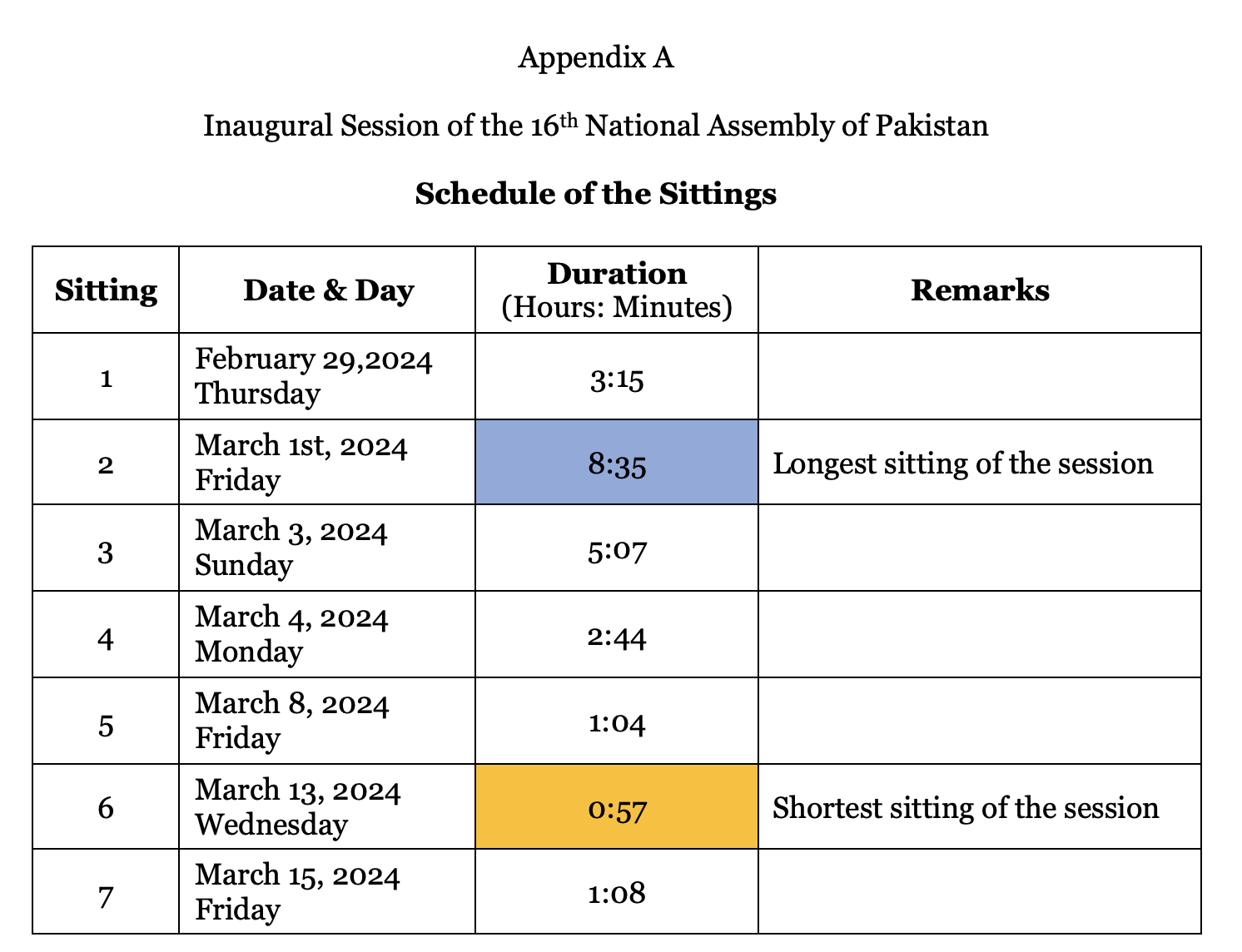
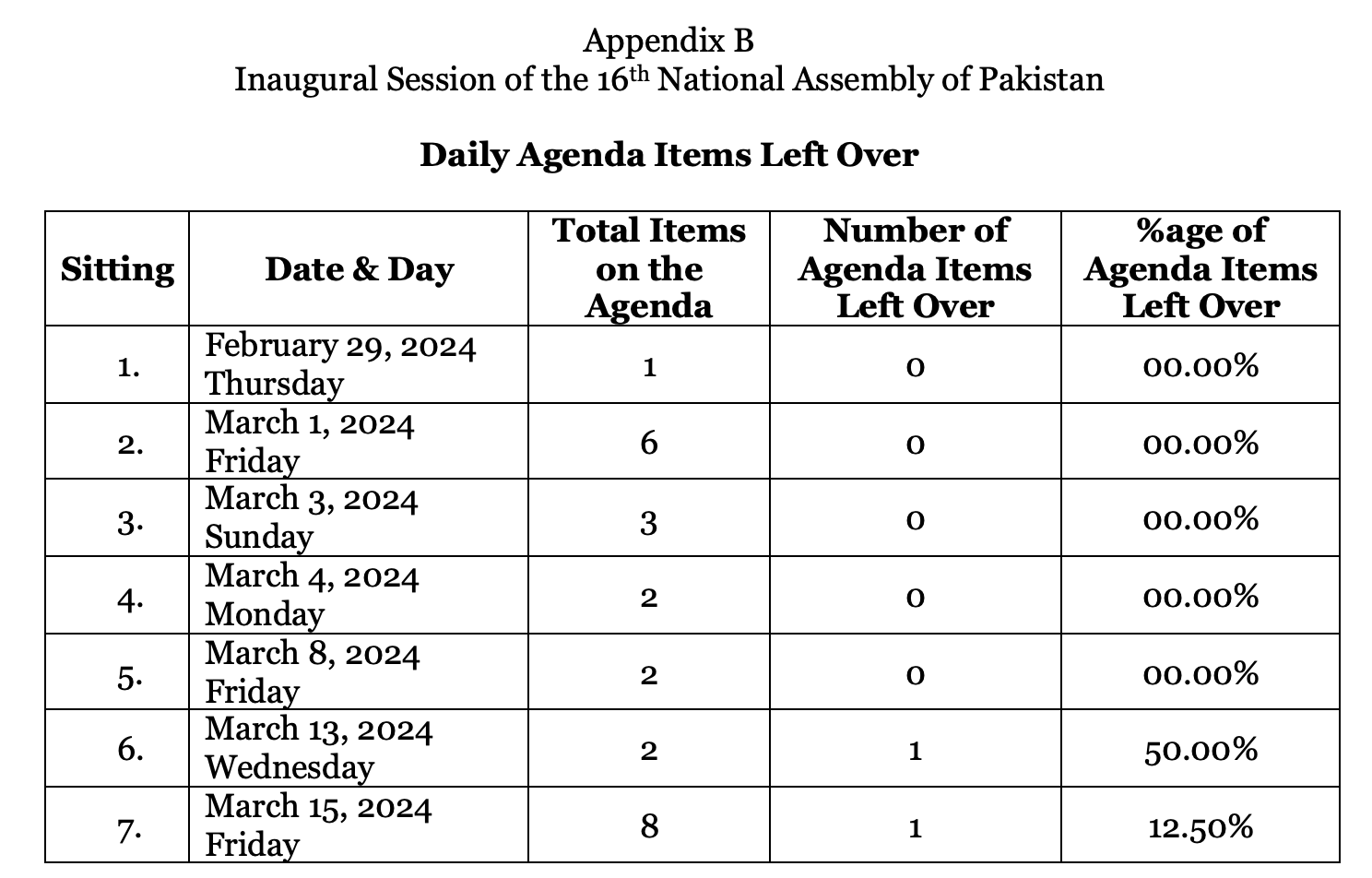
References
-
Nadir Guramani, “Newly elected representatives sworn in as ruckus mars maiden session of 16th National Assembly,” Dawn online, February 29, 2024, accessed February 29, 2024. https://www.dawn.com/news/1818028. ↑
-
Syed Irfan Raza, Iftikhar A. Khan, “After refusal by president, speaker calls NA session,” Dawn online, February 27, 2024, accessed February 27, 2024. https://www.dawn.com/news/1817441/after-refusal-by-president-speaker-calls-na-session. ↑
-
Syed Irfan Raza, Iftikhar A. Khan, “Alvi relents at eleventh hour, calls NA sitting himself,” Dawn online, February 29, 2024, accessed February 29, 2024. https://www.dawn.com/news/1817900/alvi-relents-at-eleventh-hour-calls-na-sitting-himself. ↑
-
“Instead of impeachment, President Alvi to be replaced via electoral process: Bilawal,” The News International online, February 27, 2024, accessed February 28, 2024. https://www.thenews.com.pk/latest/1162121-instead-of-impeachment-president-alvi-to-be-replaced-via-electoral-process-bilawal. ↑
-
Nadir Guramani, “Newly elected representatives sworn in as ruckus mars maiden session of 16th National Assembly,” Dawn online, February 29, 2024, accessed April 29, 2024. https://www.dawn.com/news/1818028. ↑
-
Waqas Ahmad, “Record number of newcomers enter NA,” The Express Tribune online, February 16, 2024, accessed April 30, 2024. https://tribune.com.pk/story/2456577/record-number-of-newcomers-enter-na. ↑
-
Nadir Guramani, “Allied parties clinch speaker, deputy slots in National Assembly,” Dawn online, March 01, 2024, accessed April 29, 2024. https://www.dawn.com/news/1818343. ↑
-
“Shehbaz Sharif elected prime minister for 2nd time, vows to steer Pakistan ‘back to shore’ in victory speech,” Dawn online, March 03, 2024, accessed April 29, 2024. https://www.dawn.com/news/1818835. ↑
-
“NA extends 7 ordinances promulgated by caretakers,” The News International online, March 16, 2024, accessed April 22, 2024. https://www.thenews.com.pk/print/1168689-na-extends-7-ordinances-promulgated-by-caretakers. ↑
-
Amir Wasim, “IMF-directed ordinances spark ‘betrayal’ cries in NA,” Dawn News online, March 16, 2024, accessed April 28, 2024. https://www.dawn.com/news/1821753. ↑
-
“NA extends seven ordinances amidst opposition tumult,” The Nation online, March 15, 2024, accessed April 22, 2024. https://www.nation.com.pk/15-Mar-2024/na-extends-seven-ordinances-amidst-opposition-tumult. ↑
-
“NA extends 7 ordinances promulgated by caretakers,” The News International online, March 16, 2024, accessed April 22, 2024. https://www.thenews.com.pk/print/1168689-na-extends-7-ordinances-promulgated-by-caretakers. ↑
-
Rizwan Shehzad, “First NA session marred by ruckus,” The Express Tribune online, February 29, 2024, accessed April 21, 2024. https://tribune.com.pk/story/2457975/first-na-session-marred-by-ruckus. ↑
-
Aamir Saeed, “Pakistan’s National Assembly elects Ayaz Sadiq as 23rd speaker amid opposition protest,” Arab News online, March 01, 2024, accessed April, 21, 2024. https://www.arabnews.pk/node/2469246/pakistan. ↑
-
“Update on The Performance of Democratic Institutions | March 2024,” PILDAT, April 08, 2024, accessed April 29, 2024. https://pildat.org/top-featured/update-on-the-performance-of-democratic-institutions-march-2024. ↑
-
“Shehbaz Sharif elected prime minister for 2nd time, vows to steer Pakistan ‘back to shore’ in victory speech,” Dawn Online, March 3, 2024, accessed April 21, 2024. https://www.dawn.com/news/1818835. ↑
-
It must be noted that PILDAT has classified that a policy issue is such that involves any legislation or a recommendation on devising a policy. ↑






